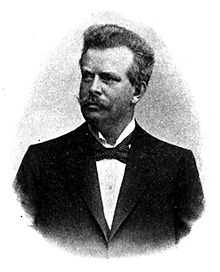Heinrich Unverricht

Heinrich Unverricht (September 18, 1853 - April 22, 1912) was a German internist who was a native of Breslau.
In 1877 he obtained his doctorate from the University of Breslau, where he was a student of Michael Anton Biermer (1827-1892). Later he was a professor at Jena (1886) and Dorpat (1888), where he resigned in 1892 for political reasons, and became director of the city hospital at Magdeburg-Sudenburg.
Heinrich Unverricht is most remembered for his research of epilepsy, especially his work with progressive myoclonus epilepsies (PME). In 1891 he described a form of PME that was later come to be known by the eponymous label "Unverricht-Lundborg disease".
Equally notable, however, following Wagner (1863) and Virchow's (1866) initial clinical descriptions, in 1891[1] he developed the concept of an intimate connection between rash and muscle weakness that defined a new disorder: "...it seems to me that the skin appearance plays such an important role in the disease picture that the designation Polymyositis is not completely accurate. In our case, the partnership of the skin and muscle disease allows us to use the elocution Dermatomyositis..." (translation).[2] The condition is sometimes referred to as "Wagner–Unverricht syndrome".[3][4]
Unverricht published over fifty medical works, including Studien über die Lungenentzündung, his prize-winning doctorate thesis on pneumonia.
References
- ↑ Unverricht, H (1891). "Dermatomyositis acuta". Dtsch Med Wochenschr 17: 41–44. doi:10.1055/s-0029-1206170.
- ↑ Levine TD History of Dermatomyositis. Arch Neurol 60:780-782, 2003
- ↑ Google Books Differential Diagnosis for the Dermatologist by Scott M. Jackson, Lee T. Nesbitt Jr.
- ↑ http://www.whonamedit.com/synd.cfm/3292.html Wagner-Unverricht syndrome] @ Who Named It
- Stephen Ashwal (1990). The founders of child neurology. Norman Publishing. ISBN 0-930405-26-9.
- Heinrich Unverricht at Who Named It
|